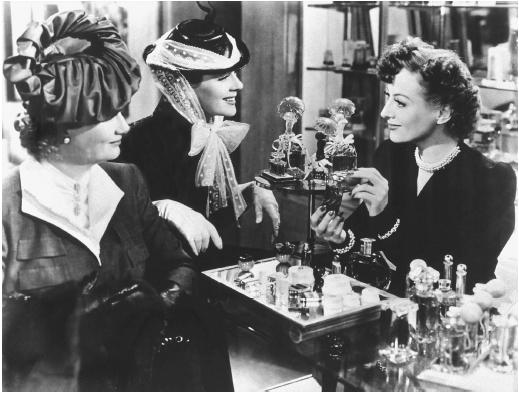Dir: George Cukor
Plot: Mary Haines finds out her husband is cheating through her gossip queen friends, goes to Reno to get divorce. Realises how she cannot possibly live without her man, even though he's a cheating rat bastard - after all, her annoying tendency to remain the same is what drove him away in the first place, right? Surprisingly frequent laughs ensue.
Almost perfect satirical comedy, a look at the nature of sheer bitchiness which, even 70 years on, is still painfully accurate. The all-female cast is absolutely fantastic, with Norma Shearer giving the film its dramatic fuel while the big laughs come from a shining supporting cast. Rosalind Russell absolutely steals the show as queen bitch Sylvia, whose entrance to her cousin's party sets the tone for the entire film:
Edith Potter: [Wiping her hands on towel] Oh, cheap Chinese embroidery, you know I'll bet Peggy gave her these...
Sylvia Fowler: It wouldn't be so bad if only Mary's friends knew we could keep our mouths shut.
Edith Potter: I know plenty I'd never breathe about my friend's husbands.
Sylvia Fowler: Oh so do I!
[They both turn around and look at each other]
Edith Potter: Well you know I adore Mary!
Sylvia Fowler: I worship her, we're not only cousins, she's my dearest friend in the world, after all we WERE raised together!
[Turns around quickly]
Sylvia Fowler: Oh Edith I forgot to tell you...
[Whispers to Edith]
Mary Haines: Break it up girls! Break it up!
Edith Potter: Darling!
Mary Haines: Hello!
Edith Potter: You're so slim I could kill you.
Paper cannot do justice to the pure frenetic energy of this exchange, which can be seen replicated in bathrooms and in offices and in hairdressers wherever more than one female happens to be present (myself woefully included), and the spirit of which I have never seen captured better. The feminine tendency towards gossip may seem like a rather hackneyed peg to hang your comedy on, but the film also challenges preconceptions about "how" women are allowed to be funny by relying equally on the cast's talent for physical comedy. Slapstick is not something which frequently tickles my personal funnybone,but Rosalind Russell in particular had me laughing out loud several times - particularly the moment when she is so preoccupied by eavesdropping that she walks into a wall: a simple gag performed to perfection. Also worth a mention is Mary Boland, hysterical as the absurd dowager wailing 'L'amour, l'amour!' at every opportunity.
The direction is unintrusive on Cukor's part, and one gets the feeling he is simply winding up this uniquely gifted cast and letting them go. There are however a couple of moments of unmistakeable directorial flair, most notably the long, intricate tracking shot through a beauty spa which begins the film and which is a real knockout. The ending, a breathtakingly energetic and very funny scene, is filmed all inside one large room with great verve and vigour by the indefatigueable Cukor. Moreover, the film is beautiful to look at, a treasure trove of striking and occasionally eye-popping 1940s get-ups, although I'm not entirely sure what the point of including a 10+ minute colour sequence of a fashion show was.
The only flaw of this picture comes not from its technical presentation or its performances, but from some horrendously jarring moments of pre-pre-pre-feminist attitudes. In its defence, it does have Norma Shearer's character react to her mother's advice to ignore her husband's affair with a tirade condemning such reactionary ideas and affirming the equality of the sexes. However, we are later treated to some cringingly terrible gems on marriage - my personal favourite (!) being one of the would-be divorcees telling her husband she is pregnant and then exclaiming raptuously to her friends "When I get home, I'm going to do everything John says!". Lordy. However, this is an unavoidable flaw as time marches on and should not detract from the enjoyment of the film. In fact, the incongruity of these outdated opinions to a modern audience might even add to the humour, albeit unintentionally.
For a superbly-acted satire on the complexities and paradoxes of female friendship, look no further. As Joan Crawford's character declares in the final denouement: "There's a name for you, ladies, but it isn't used in high society... outside of a kennel."
9/10 (less one for disappointingly mousy attitude towards male adultery which leads to some unsatisying plot resolutions)



This is one of my all time favorites, Gillie! Great review. Yes, the fashion show is so strange, it reminds me of all the unnecessary dream sequences in old musicals. Keep up the good work. Miss you lots and hope you find a way across the pond sometime soon :)
ReplyDelete